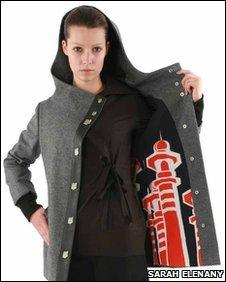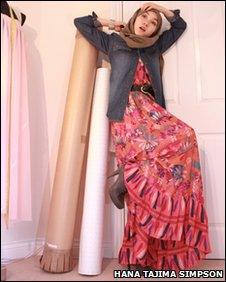Muslim designers mix the hijab with latest fashions
- Published
How do you combine Western fashion with a Muslim dress code?
Fashion is a form of self-expression. It's all about experimenting with looks and, in many cases, attracting attention.
The Islamic headscarf, or hijab, is exactly the opposite. It's about modesty and attracting as little attention as possible.
However, a growing number of Muslim women are successfully blending the two.
They get inspiration from the catwalk, the high street and fashion magazines, and they give it a hijab-friendly twist - making sure that everything except the face and hands are covered.
They are known as Hijabistas.
Jana Kossiabati is editor of the blog Hijab Style, which gets as many as 2,300 visits a day from across the world, including Africa, Middle East and the United States.
"I started two-and-a-half years ago," says Jana, who is British of Lebanese origin.
"I'd seen so many fashion blogs and so many Muslim blogs but hadn't seen anything specifically dedicated to the way Muslim women dress.
"I started my own site to bring together elements of what Muslim women are looking for and to make mainstream fashion wearable and relevant to them."

Sarah's range is sporty and features Islamic art
Fitting in
Jana says one of the reasons why so many young Muslim women are reading hijab fashion blogs is that the Muslim fashion industry is lacking inspiration.
"I get comments on my blog from people saying that the clothes offered to Muslim women are too Islamic looking - they look very ethnic, very foreign," says Jana.
"Young Muslims are increasingly looking for fashion that doesn't set them apart from the rest of society."
According to Jana, events such as 9/11 and 7/7 also had an effect on fashion-conscious Muslim women.
"Our generation became more aware of their identity when were thrust into the limelight after 9/11 and 7/7 and other events of the past decade or so. We were forced to deal with people questioning our faith, our identity and the way we look."
This may have prompted some women to choose to wear the hijab - but it also increased the urge among many young hijab-wearing women to fit in.
Experimentation
Hana Tajima Simpson is a fashion designer who converted to Islam five years ago.
In the beginning, she found it very hard to find her own style while following hijab rules.
"I lost a lot of my personality through wearing the hijab at first. I wanted to stick to one mould and look a certain way," says Hana, who comes from a British and Japanese background.
"There was a certain idea I had in my head about how a Muslim woman should look which is the black Abaya (baggy dress and scarf), but I realised that this is not true and that I could experiment with my looks, while being modest.
"It took a lot of trial and error to a find a style and a look I'm happy with."
Hana regularly blogs about her designs at Style Covered. While all her clothes are suitable for women who wear the hijab, she says she doesn't design with a specific group of people in mind.
"Frankly I design for myself.
"I think about what I'd like to wear and design it. I have many non-Muslim customers as well, so my designs are not targeted at Muslims alone."
Celebration
Designer Sarah Elenany's clothes are quite different from Hana's - more urban and sporty.

Hana believes hijab can be colourful
Islamic prints feature heavily on almost all of her outfits, including images of minarets and hands being extended to the heavens in prayer. They are religious, but far from traditional.
"My label is a celebration of Islamic culture and art and it's not apologetic. It says' this is it, this is us. I wanted to design prints and clothes that Muslims could look at and instantly identify with," says Sarah.
But doesn't the showy nature of fashion contradict the essence of Hijab?
Sarah disagrees. Fashion is about expression "and this is a legitimate part of Islam," she says.
Jana adds, "Islam doesn't prescribe rigid rules of colour or style it just says these are the areas you need to cover, the rest is really up to you."